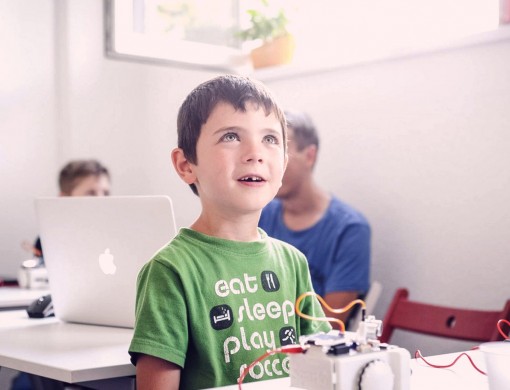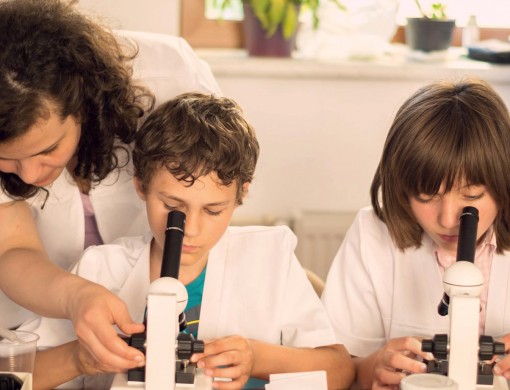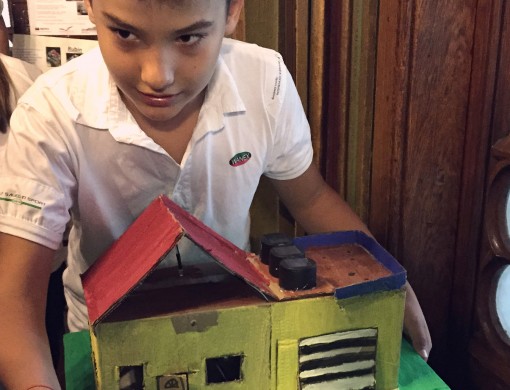Author: Teia Brânză
Background photo: Laboratorul lui Ben
Photo: Gabriela Cuzepan
Someone’s wise words – “without passion, there won’t be any progress” – have ricocheted from the wall of my revolt against the mishaps of the educational system. In order to sow the passion for science, one has to tickle young minds, place them in a favorable learning context and give them enough time to try enough things and become interested. Passion does not spring from the desert, it is cultivated through hard work and patience.
My “basement” memories pale, however, before the luminous eyes of a 9-year-old boy. Wow! He tells his mom how he built an alarm/doorbell with his own hands. The little electronic engineer is one of the beneficiaries of the Științescu Fund, a funding program for educational projects for children aged 6 to 19, implemented by Fundația Comunitară Sibiu (FCSB). But let me tell you how passion can complement science and not be oxymoronic, or why I was so impressed by the Științescu Fund.
A Favorable Environment for Mobilizing Community Resources There are, more often than not, a lot of project ideas, with the associated fears and doubts, but little money. In this ambiguous atmosphere, community foundations step in because they know local needs and mobilize community resources towards the directions they identify as priorities. Cartoony, I know, but please imagine a huge sock where community members with means save money and everybody else stores ideas and dreams. The community foundation takes over the responsibility for this “sock” and manages resources in a very transparent manner.
The usefulness of a thematic fund like Științescu is given by the very frame it created, which is conducive of long-term cooperation. Those with a passion for STEM (Science, Technology, Engineering, Mathematics) education – be they investors, implementers or beneficiaries – have an opportunity to meet, communicate and enjoy these results together.
One Year of Științescu Is Completed, the Program Continues
At the closing event for the first round of the Științescu Fund, Suzana Dobre, as a representative of the Romanian-American Foundation (the partner supporting FCS in developing the project), sums up the results of the program with evident joy.
“15 projects, 1889 direct beneficiaries, 6654 hours of volunteer work, 81 project team members, 121,317 lei total value of funding, better trained children and millions of smiles.” This is one year of Ştiinţescu in a nutshell.
“As far as we’re concerned, the project in Sibiu was a success. The Științescu program was well received, it’s also true that, in Sibiu the message of the community foundation grew from fertile soil, as there are so many IT companies with potential and investment power”, Suzana Dobre adds.
The fact that this program was received by the community and investors with open arms is confirmed by the words of Ciprian Ciocan, the Sibiu Community Foundation executive director: “First off, our aim was to start a debate about education in the community. Basically, to bring education back in the community, to bring together educators, companies, institutions, students, parents or just people who are passionate about sciences and education. So we launched this challenge: are you a science, engineering, technology or mathematics enthusiast? If yes, share this enthusiasm! Fortunately, we found extraordinary people who responded to this challenge and proved once more that passion is crucial in everything we do.”
The good news is that it’s possible for Științescu to “conquer” the whole country. There are 15 community foundations in Romania, of which two, from Sibiu and Bucharest, implemented a pilot of the Științescu Fund, while the Cluj and Iași foundations will start it soon. All the other foundations stated their interest in replicating the Științescu Fund. With the help of an already formed network, I don’t find it difficult to imagine the expansion of this educational initiative in other regions.
Science as Play: Learning by Working Together
Științescu meant many hours of play for the children and youths involved: chemistry and physics experiments, understanding the world seen through a microscope, robotics and robot programming through Sparki, coding sessions for high school students delivered by international students, creative IT and electronics activities. This “scientific play” stirred new passions and dreams in the children’s minds. Tudor, who explored the world under a microscope lens in “Ben’s Laboratory” tells us that, after this experiment, he would like to become a surgeon. His face becomes serious, academic-like, when he explains how team work is more important than competition: “You need to have order in your life, like the elements of a cell, and work in a team, like a cell’s functions.”
Științescu Fund projects apply two concepts everyone in the educational field speaks about with passion: peer learning and scaffolding. Peer learning provides an environment where children learn from one another, ideas, knowledge and experiences are shared, under the supervision of an adult mentor. These adults, who are involved in the learning process, provide help for children with their own development. This means that help is adjusted to each child’s performances (what psychologists call scaffolding).
The advantages of informal education have been noticed by investors as well. Georgiana Hanea (Marketing specialist, Keep Calling): “We thought the project was interesting because it provides children with an informal learning environment, through games and play, and gives them the opportunity to get involved, to discover answers by themselves and to come with their own solutions to the challenges before them. Moreover, they will develop skills as well as knowledge, by learning how to work in teams, and developing communication and critical thinking. All of these things formal education does not emphasize. It’s important to support technology education because technology is one of the innovation sources both at the microeconomic (company) level and at the macroeconomic (country) level.Also, we thought it was great to see so many girls involved in the projects supported through the Științescu Fund. If these girls maintain their interest in STEM subjects, it’s possible to have more women engineers or IT specialists in the future.”
How Științescu Persuaded/Attracted Investors
Many local companies, among which ITNT, Visma Software, IQUEST, EBS Romania, Keep Calling, GITS, and Pro Language provided funding, because they were attracted by the idea and the favorable environment created by Fundația Comunitară Sibiu. “The Științescu fund persuaded me because of the different approach. Usually, when we talk about education, there is too much theory and too little practice involved. The information is provided without explaining the context. Științescu is different because not only does it send information, but it also raises interest in science, which is a more important achievement”, said Lucian Todea, General Manager ITNT.
“Fundația Comunitară came to us with a proposal to support the Științescu Project and we thought it was interesting because it clearly met a need we had identified ourselves, namely that of finding more suitable graduates in Sibiu. Results will be seen in time. It’s possible for the children who join the projects of the Științescu Fund to discover their interest in or even passion for STEM subjects and maybe choose a career in this area”, Georgiana Hanea (Marketing specialist, Keep Calling) shared with us.
Diana Tatu, Pro Language manager, said that the Științescu Fund was convincing because the projects were easily applicable. “We wanted children to learn in a different manner. To have access to IT, biology and science labs. There is an infinity of beautiful, interesting and useful things in education. It is also important for businesses to get involved. Without funding, always waiting for money from the budget, things would not be moving as fast as ideas and initiatives are. This is how we raise young generations well. I myself grew professionally due to these non-formal education projects, through interaction. I believe they should have access to them as well.”
Another fact that keeps us optimistic is that most sponsors already announced that they would like to continue to fund the program. Therefore, these donations have gone past a one-off helping hand and sponsors understand that through sustainable cooperation investors pay more attention to the implementation of the projects they support.
Cantemir Mihu, Site Manager Sibiu, with EBS Romania, recounted how he followed the evolution of these projects and the activities part of the Științescu Fund: “I was pleasantly surprised to learn from my own children, a 9th and a 3rd grader, that they heard of or even worked in some of these projects. I think the program was well organized and has a great impact for the Sibiu community.”
Not All Companies Seek Profit Only
If 82% of the consumers in the USA take into account social responsibility when choosing a certain product or service (as shown in a 2013 study), do companies in Romania have anything to do with this concept? I was wondering about that before I had the chance to see how enthusiastic these companies were about getting involved in the Științescu Fund.
“When a company selects which projects to support, it is not an easy decision to make. There are many initiatives worth helping. With the Științescu Fund, we thought it was the best way to support and develop the community: using money from the private businesses, managed by a nonprofit. Most large companies are aware of the need to support their communities and implement some Corporate Social Responsibility projects. Administrative work is, in many cases, the real hindrance. In the case of the Științescu Fund, through Fundația Comunitară Sibiu, companies could influence community development with STEM subjects”, explained Cantemir Mihu, Site Manager Sibiu, EBS Romania.
I realize now that not all companies seek profit and publicity only, that some of them want to be respected in society and would probably get more involved in the community if given simple and flexible investment mechanisms. I also understand that, for now, change is maintained though impactful ideas that convince, inspire and slowly transform society as a whole.







